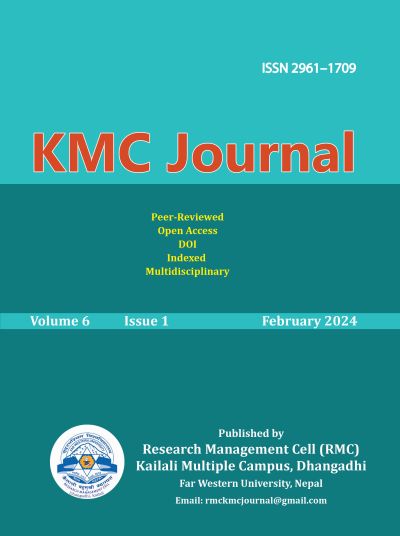Factors Associated with Psychosocial Stimulation Development of Preschool Children in Rupandehi District of Nepal
DOI:
https://doi.org/10.3126/kmcj.v6i1.62326Keywords:
Associated factors, primary caregivers, psychosocial developmentAbstract
Creating fun learning games, telling stories, and sharing warmth in social interactions are important for helping kids grow well; it is like planting seeds for a bright future workforce for the nation. This study aimed to assess factors associated with psychosocial stimulation development in 401 preschool children (3-5 years) in the Rupandehi district of Nepal. A cross-sectional survey was conducted using a multistage random sampling technique. Socioeconomic and demographic data, as well as psychosocial stimulation levels, were collected through validated instruments, interviews, and direct observation. IBM SPSS version 26 was used for data analysis, with a significance level of p<0.05. Among the participants, 50.4% were economically marginalized, and only 1.2% caregivers offered high levels of psychosocial stimulation to their preschoolers. Positive associations were found between the number of children, family type, caste/ethnicity, parental education, and wealth status in the unadjusted analysis. In multivariate analysis, the psychosocial stimulation received by preschool children was positively associated with wealth status, caste, mother’s education, family structure and father’s education. Wealth status, caste, family structure, and parental education emerged as key factors influencing the psychosocial stimulation development of preschool children. Implementing strategies to promote psychosocial stimulation within families from economically marginalized backgrounds, disadvantaged castes (including Dalit, non-Dalit Tarai caste, and Janajati groups), with illiterate parents, and those living in nuclear family structures could potentially make a substantial contribution towards enhancing psychosocial stimulation among preschool children.
Downloads
Downloads
Published
How to Cite
Issue
Section
License

This work is licensed under a Creative Commons Attribution-NonCommercial 4.0 International License.
This license allows reusers to distribute, remix, adapt, and build upon the material in any medium or format for noncommercial purposes only, and only so long as attribution is given to the creator.




